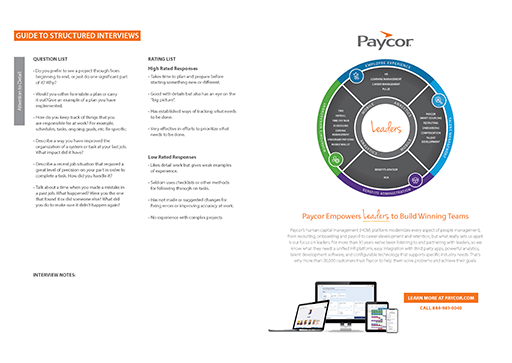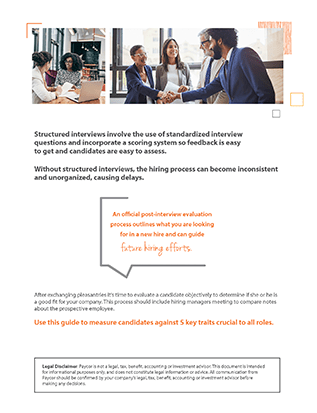One Minute Takeaway
- Structured interviews offer advantages such as reducing bias, increasing credibility, and improving efficiency in the hiring process.
- Three types of structured interview questions: job-specific, behavioral, and situational.
- The disadvantages of structured interviews include the formality, limited flexibility, and confined scope.
Structured interviews are a powerful tool for employers looking to hire the best talent for their organizations. By using a consistent set of questions and rating criteria, hiring managers can effectively evaluate candidates and make objective decisions. In this article, we’ll delve into the benefits of structured interviews, the types of questions to ask, and how to conduct these interviews effectively.
Why Use Structured Interview Questions?
Structured interview questions offer several advantages over traditional, unstructured interviews. They help reduce bias by ensuring that all candidates are evaluated based on the same criteria. This approach also improves the reliability and validity of the interview process, leading to better hiring decisions. Ultimately, using structured interview questions allows employers to identify the most qualified candidates for a position in a fair and efficient manner.
Enhancing DE&I Initiatives with Structured Interviews
Structured interviews can play a significant role in promoting DE&I within an organization. By using a consistent set of questions and rating criteria, employers minimize the influence of personal biases and unconscious preferences, leading to more objective and fair hiring decisions. This objectivity helps to ensure that candidates from diverse backgrounds are given equal consideration, fostering a more inclusive workplace environment.
Three Types of Structured Interview Questions
Hiring managers have three main types of structured interview questions that should be included when developing their interview process: job-specific, behavioral, and situational. These questions help assess a candidate’s qualifications, experience, and potential fit within the organization.
- Job-specific. Job-specific questions focus on the candidate’s knowledge and expertise in relation to the position they are applying for. These questions can range from technical inquiries to role-specific responsibilities, giving employers a better understanding of the candidate’s ability to perform the job.
- Behavioral. Behavioral questions are designed to assess how a candidate has managed specific situations in the past. By asking about real-life examples, employers can gain insight into the candidate’s problem-solving abilities, interpersonal skills, and overall work ethic.
- Situational questions present hypothetical scenarios to the candidate and ask how they would respond in those situations. These questions help gauge the candidate’s ability to think on their feet, adapt to new challenges, and make decisions under pressure.
How Structured Interviews Differ from Others
Structured interviews differ from other interview formats in their consistency and predefined set of questions. While they offer several advantages, it’s essential to understand how they compare to alternative approaches such as semi-structured, unstructured, and focus group interviews.
- Semi-Structured Interviews. Semi-structured interviews combine elements of both structured and unstructured interviews. They typically begin with a set of predetermined questions, but the interviewer has the flexibility to ask follow-up questions or explore topics in more depth based on the candidate’s responses.
- Unstructured Interviews. Unstructured interviews are informal and open-ended, allowing for free-flowing conversation between the interviewer and the candidate. While they can help build rapport and uncover unique insights, they may also lead to inconsistencies in the evaluation process due to a lack of structure.
- Focus Group Interviews. Focus group interviews involve a group of candidates or employees discussing specific topics in a guided conversation. While this format can generate diverse perspectives and ideas, it’s not ideal for evaluating individual candidates’ qualifications for a specific role.
Advantages of Structured Interviews
Structured interviews offer several key benefits for employers, including reducing bias, increasing credibility, and improving efficiency in the hiring process. Understanding these advantages can help organizations make informed decisions about implementing structured interviews in their hiring practices.
- Reduce Risk of Bias. By using a consistent set of questions and rating criteria, structured interviews help minimize the influence of personal biases and unconscious preferences, leading to more objective and fair hiring decisions.
- Improved Credibility, Reliability, and Validity. Structured interviews ensure that each candidate is evaluated based on the same criteria. This consistency helps improve the overall quality of the hiring process and increases the likelihood of selecting the most qualified candidates for the position.
- Simple, Cost-effective, and Efficient. Structured interviews streamline the hiring process by providing a clear framework for evaluating candidates. This simplicity can save time and resources, making it a cost-effective option for organizations looking to optimize their recruitment efforts.
Disadvantages of Structured Interviews
While structured interviews offer numerous benefits, they also have certain limitations. It’s crucial for employers to be aware of these drawbacks in order to make informed decisions about their interview process.
- Very Formal. Structured interviews can feel more rigid compared to unstructured interviews. This formality may hinder the ability to build rapport with candidates and potentially discourage open and candid conversation.
- Limited Flexibility. The predefined nature of structured interviews may limit the interviewer’s ability to explore topics in depth or ask follow-up questions based on the candidate’s responses. This lack of flexibility can sometimes lead to missed opportunities for gathering valuable information.
- Confined Scope. Since structured interviews focus on a specific set of questions, they may not cover all aspects of a candidate’s qualifications, experience, or personality. This confined scope could result in overlooking key traits or skills that may be relevant to the position.
Preparing to Conduct a Structural Interview
To conduct a successful structured interview, employers need to invest time and effort into the preparation process. This includes identifying crucial skills, drafting relevant questions, developing evaluation systems, and training hiring managers.
- Identify hard and soft skills crucial for the position. Determine the specific hard (technical) and soft (interpersonal) skills that are essential for success in the role. This will help guide the development of interview questions and the evaluation criteria.
- Draft behavioral and situational questions to assess relevant hard and soft skills. Create a list of questions that target the identified hard and soft skills, using a mix of behavioral and situational questions to assess the candidate’s qualifications and potential fit.
- Include position-specific interview questions. Incorporate job-specific questions that focus on the candidate’s knowledge, expertise, and experience related to the position.
- Develop a system for evaluating and rating candidates. Establish a standardized rating system to objectively assess each candidate’s responses during the interview.
- Educate hiring managers on the proper procedures for structured interviews. Train hiring managers on the structured interview process, ensuring they understand the importance of consistency, objectivity, and adherence to the predetermined questions.
- Disseminate structured interview questions and the candidate evaluation system. Share the interview questions and rating system with all relevant stakeholders, such as hiring managers and interviewers, to ensure a consistent approach across the organization.
- Organize meetings for providing feedback with hiring managers. Schedule regular meetings with hiring managers to discuss the structured interview process, share feedback, and address any concerns or challenges that may arise.
Conducting Structured Interviews
Once the preparation process is complete, it’s time to conduct the structured interviews. Following a systematic approach will help ensure a consistent and efficient evaluation of candidates.
- Greet the Candidate. Begin the interview by welcoming the candidate, making them feel comfortable, and setting a professional tone for the conversation.
- Proceed to ask each question on the list in a systematic order. Ask the predetermined questions in a consistent order, ensuring that each candidate receives the same set of inquiries.
- Allow sufficient time for the candidate to respond. Give candidates enough time to think about their responses and answer the questions thoroughly, without rushing or interrupting them.
- Rate each answer promptly. Using the established rating system, evaluate each of the candidate’s responses as soon as they have finished answering. This will help maintain objectivity and prevent biases from influencing the assessment.
- Conclude the interview. Wrap up the interview by thanking the candidate for their time, providing information on the next steps in the hiring process, and addressing any questions they may have.
Continuous Improvement and Monitoring of DE&I Initiatives
You should continually monitor and evaluate your hiring processes to ensure that structured interviews effectively support DE&I initiatives.
- Analyze hiring data. Regularly review hiring data to identify trends, areas of improvement, and potential biases within the interview process. This will help ensure that structured interviews contribute to a diverse and inclusive workforce.
- Gather feedback from candidates and hiring managers. Solicit feedback from candidates and hiring managers about their experiences with the structured interview process. This feedback can provide valuable insights for refining and improving the process.
- Adjust the interview process as needed. Based on the analysis of hiring data and feedback, make any necessary adjustments to the interview process. This may involve updating questions, refining evaluation criteria, or providing additional training for hiring managers.
Structured interviews offer numerous advantages to employers looking to improve their hiring processes. By understanding the different types of structured interview questions and following a systematic approach, organizations can effectively evaluate candidates, minimize bias, and make better hiring decisions. With proper preparation and execution, structured interviews can be a valuable tool in selecting the best talent for your organization.
Get the Guide
To further assist you in implementing structured interviews in your organization, download our comprehensive guide, which includes templates, examples, and best practices for structured interviews.











